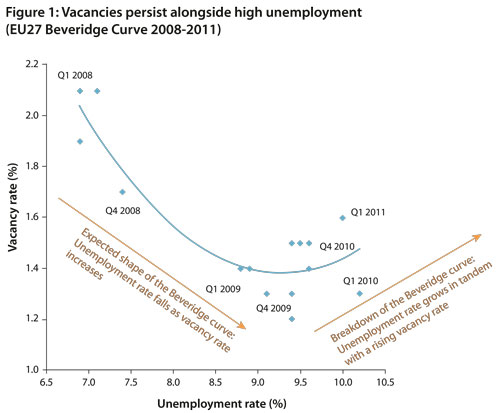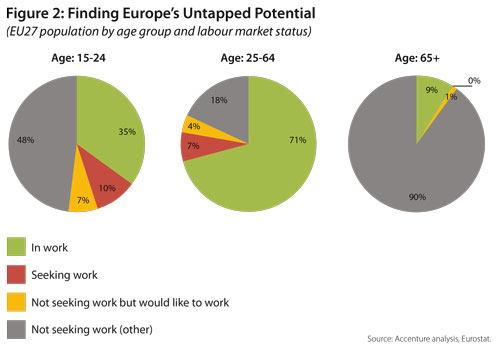By Tim Cooper, Athena Peppes, Mark Purdy and Matthew Robinson
Europe is facing a jobs and unemployment crisis that is unprecedented in recent times
• Since the start of the economic and financial crisis in mid-2008, Europe has lost nearly 6 million jobs.
• Unemployment stands at its highest level since 1998. Since mid-2008, the number of people unemployed for longer than one year in Europe has risen by 61 percent, from 6.1 million to 9.8 million. And in some European countries, such as Spain and Greece, youth unemployment is reaching 50 percent.
• Even if Europe were suddenly to generate growth of 2 percent, it would still not reach pre-crisis levels of employment until 2014. At an annual GDP growth of 0.5 percent, which is above the current rates, it would not happen until 2019.
Within that context, there are two paradoxes that are further complicating an already difficult picture. First, despite record high unemployment, Europe continues to experience significant shortages of workers with key skills. This is particularly true for international business skills such as foreign languages, the ability to manage cross-border teams, and cultural awareness—all crucial for success in the current global job market—along with skills in science, technology, engineering, and math (STEM).
The current combination of high vacancies alongside high unemployment is extremely rare, indicating that the traditional relationship between job openings and unemployment (known as the ‘Beveridge curve’) appears to have broken down recently (see Figure 1). This suggests a mismatch: the location or skills of unemployed workers in Europe simply do not correspond to the location or skills of the positions available..
[ms-protect-content id=”9932″]
The second paradox facing Europe is that investment in human capital is usually lowest when needed most. Our recent analysis of Europe’s labour market, engagement with a panel of leading academics and policy experts, and survey of 500 decision makers across Europe support this conclusion. Seventy-two percent of survey respondents held that it is necessary for Europe to increase investment in education and skills development, especially during weak economic conditions. However, 86 percent of decision makers report that they have either reduced or frozen their levels of investment in skills and training over the last 12 months. With Europe’s economic prospects continuing to be gloomy, only 18 percent of leaders report that their organisations will be increasing investment in human capital in 2012.
There is a real danger that this is simply not enough. Other economies around the world are stepping up their efforts to develop human capital and realign training and education efforts to specific job-market needs, putting Europe at risk of being left behind. Unless policymakers and business leaders in Europe take action soon, the region’s competitiveness within the global economy may be irreparably damaged.
Our research points to three critical imperatives to better manage today’s crisis while positioning for tomorrow’s growth. Specifically, the region must: 1) activate untapped labour pools; 2) improve the mobility and transferability of skills; and 3) broaden and deepen collaboration around labour issues.
1. Raising the Water Level: Activating Untapped Labour Pools
As a starting point, Europe needs to do more in order to increase the size of the talent pool from which it can draw. In fact, amid persistent skills shortages, there is a large reservoir of talent in Europe that currently remains untapped. Efforts to address the unemployment problem often founder because the entire out-of-work population is treated as a uniform group, an approach that fails to recognise the fundamental differences between an unemployed person who is skilled but needs retraining for another career, one whose education or skill levels are underdeveloped, and one whose work-related skills have been corroded by long periods of involuntary inactivity.
For example, among the 25 million current unemployed people in Europe, there is a significant cohort of long-term unemployed—defined as those out of work for a year or longer—who will likely need some form of retraining to resume their place in the workforce. However there are also many people whose skills are still fresh and in demand by employers, and who can reintegrate into the labour pool more directly.
In addition, there is significant potential among ‘discouraged workers,’ people who are not actively seeking employment but would like to work, a total of more than 15 million in Europe (see Figure 2). Key groups in this category include older people (aged 65-74), women (aged 25-64), mothers, and young people (aged 15-24). The typical reasons these people are not seeking work include family or personal responsibilities, disability or illness, temporary layoff, retirement, or a perception that no work is available. Unemployment rate statistics do not take this group of workers into account. Doing so would imply an unemployment rate of 15.7 percent, compared with the ‘official’ rate of 10.2 percent.
While there are a number of challenges associated with bringing the unemployed and discouraged workers back into employment, Europe has the potential to significantly increase the size of its skills pool. Tapping into new workforces requires organisations to rethink the ‘who, where and how’ of recruitment. To that end, organisations and governments should:
• Use analytics to generate insights from labour data: The open data revolution is transforming the way that governments and public agencies conceive of policy analysis in other areas, but these organisations must apply these lessons and approaches to employment and skills. Better data collection and more rigorous analysis can help profile those out of work, identify their characteristics and specific challenges, and track the impact of intervention measures over time.
• Deploy bespoke interventions for the unemployed: Businesses can help to reactivate skills of the unemployed by offering training, outreach or awareness programmes. Powering up the third sector and fostering greater volunteer opportunities can also help people keep their skills fresh during periods of unemployment, and help them return to permanent employment.
• Ease barriers to discouraged workers: Finally, the various subgroups among discouraged workers should be recruited back into the labour force through strategic approaches aimed at their specific needs. Among young people, for example, there is significant promise in apprenticeship schemes (cited by 46 percent of decision makers in our survey as important). Conversely, policies aimed at fostering flexible career models may hold more promise for mothers seeking to return to work.
2. Increasing the flows: Improving the mobility and transferability of skills
In addition to increasing the stock of human capital, Europe must facilitate the flows of talent, both within its borders and among other parts of the world, so that labour supply can more easily address demand. At the individual level, mobility helps people improve their economic circumstances and fulfill their job aspirations. For a business, increased mobility means a bigger and more flexible pool of available labour that the company can tap to successfully fill job vacancies.
While European citizens officially enjoy the right ‘to travel, work and live anywhere in the Union’, as enshrined in the Maastricht Treaty, the region is simply failing to punch its weight regarding mobility within the global talent market. In fact, the level of interstate labour mobility in the United States outstrips its equivalent in the European Union—for both the employed and unemployed population. Among respondents to our survey, just 47 percent of decision makers claim that they are utilising (to a significant or great extent) the full range of skills available within their domestic market. This falls to 28 percent for skills across Europe as a whole and 23 percent for skills located globally.
In addition, Europe needs to do more to attract skilled students and workers from elsewhere. Emerging markets continue to supply prodigious numbers of graduates in STEM fields. For example, more than 40 percent of all new university degrees in China are awarded in science and engineering. These new sources of talent represent a significant opportunity for Europe to meet skills shortages and drive growth in specific high-value sectors. However, European employers seem to struggle to look beyond their immediate borders when recruiting.
The hurdles to mobility often start at home, within organisations and countries. Measuring human capital at an organisational level is difficult, and skills certification—a key ingredient for mobility—is often a patchwork across industries and countries. International borders present an additional challenge, with decision makers highlighting regulatory complexity as the most significant obstacle to attracting global talent. In short, the barriers to mobility of skills into and within Europe are formidable.
Overcoming these barriers and increasing labour mobility requires a number of initiatives among organisations and policy makers in Europe, in particular:
• Improve mobility within organisations: Organisations should implement job rotations for employees, to better equip them with a more diverse set of skills and create latent talent pools that can be activated in case of restructuring. In addition, focusing on international placements can help fill a perceived gap in the international business skills, which our respondents cited as a notable gap. For example, Nestlé is currently relaunching its International Development Program in marketing and sales. The program introduces recent graduates to the company’s headquarters and product categories, and includes a 30-month assignment to a foreign market.
• Make labour certifications more consistent throughout Europe: To help improve talent flows within Europe, organisations need a consistent means of certifying, accumulating and recognising qualifications across borders. This situation has improved somewhat recently, yet 55 percent of decision makers say that more progress is needed in order to reduce cross-border confusion regarding the qualifications of employees. The same principle should apply to skills, which are often less quantifiable than specific certifications or qualifications. Workers often possess a broad range of skills that go unrecognised yet could increase their attractiveness across industries and countries.
• Establish a more streamlined approach to inward migration: Simplifying complex regulation can help attract talent (cited by 59 percent of decision makers), while immigration policy focused on highly skilled workers could also help ensure Europe receives its share of talent from other economies. The EU Blue Card scheme is a good example. Designed to attract high-skilled migrants from outside the EU, the Blue Card provides a two-year single work and residence permit across member states. Supporting actions include a streamlined and centralised visa application process and a travel permit to member countries for the holder and his or her family.
3. Building Bridges: Broadening and Deepening Collaboration
In the longer term, Europe needs a more coordinated approach to the structural changes taking place in labour markets, which are likely to trigger shortages in key sectors. By 2015, projections indicate a shortage of up to 700,000 information and communications technology (ICT) practitioners, particularly significant given the role that ICT plays in all other sectors of the economy. And as an ageing population increasingly puts pressure on European health systems, some estimates project a shortage of up to 2 million health care professionals and ancillary professionals by 2020.
The scope of the scale of the challenge means that Europe cannot rely on emergency measures forever. Instead, the region must develop a self- sustaining skills ecosystem that puts plans and programmes in place to address skills gaps before they become critical. Given the complexity of this ecosystem, the panoply of players involved in education, and the long timeframes over which interventions occur, getting the right degree of coordination and long-term investment is crucial.
Businesses have an opportunity to lead this effort—and they are ready to do so. Fifty-five percent of businesses believe they need to take a leadership role in convening multisector compacts that address skills issues, forming new alliances and partnerships as they integrate themselves more fully into the skills ecosystem.
These forward-thinking businesses can lead the way in coordinating efforts to develop human capital by championing the following strategies:
• Build partnerships between businesses and educational institutions: Businesses will need to involve themselves in the talent pipeline early on. Sixty-four percent of our survey respondents called for more business-university partnerships and alliances. By integrating further upstream into the education supply chain, businesses can shape the skills and expectations of students to help them prepare for professional success.
• Create B2B partnerships around skills: Businesses can pool resources to enhance skills and develop more versatile workforces. Forty-eight percent of decision makers surveyed indicated that investment in skills and education could be more effective through joint delivery of skills by firms in the same industry. These partnerships are even happening across different industries. For example, BASF Ausbildungsverbund is a joint training scheme that the German chemical company has set up in the Rhine-Neckar metropolitan region. The programme offers training positions in partnership with around 500 other companies: BASF assists these companies to recruit and train young people, and the apprentices rotate between partner companies as part of their training.
• Cascade higher skills standards through the supply chain: A core development in improving environmental sustainability has been driving carbon efficiency across the entire supply chain, often introduced by larger companies. Similarly, creating vertical networks between smaller and larger firms can develop skills more effectively in the workforce, as highlighted by 34 percent of our survey respondents.
A Call to Action
Arguably this approach is similar to the measures taken by policymakers following the financial crisis of 2008: an initial focus on recapitalisation in order to shore up the foundations of success; a push to increase liquidity and get the system moving again; and a broader, systemic review of the architecture that needs to be in place in the future. Applied to human capital and skills, our strategy for Europe’s revival focuses on the stock, the flows and the system of human capital development.
It is an ambitious undertaking. However, we must address Europe’s skills crisis with the same urgency and commitment that was displayed in 2008. Weathering the storm of today while positioning for the calmer waters of tomorrow will require leadership and focus on the key ingredients of success. If Europe can get these elements right, it will be well placed to develop the skills it needs to increase employment and drive economic growth.
About the authors
The authors are research fellows with the Accenture Institute for High Performance in London.





























